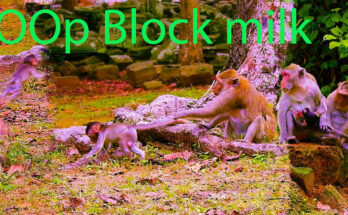Bonobos Show Emotions Like Humans
Deep in the heart of the African rainforest, bonobos live in complex societies filled with bonds of love, playfulness, and even sorrow. These fascinating primates, often called the “gentle apes,” share 98.7% of their DNA with humans, making them one of our closest relatives. But their similarities to us go far beyond genetics—bonobos express emotions in ways that mirror human behavior, proving that feelings like joy, empathy, and even grief are not uniquely human experiences.
The Power of Love and Affection
Bonobos are famous for their peaceful nature. Unlike their more aggressive cousins, chimpanzees, bonobos resolve conflicts with affection rather than violence. When tensions rise in a group, instead of fighting, bonobos use touch, grooming, and even intimate bonding to ease stress.
In the wild, researchers have observed bonobos hugging and kissing each other after a disagreement, much like humans do when reconciling. Their ability to comfort one another is a clear sign of empathy, an emotional trait once believed to be exclusive to people. Studies show that if a bonobo sees another in distress, it will often reach out, offering a reassuring touch or a gentle embrace—actions that demonstrate deep emotional intelligence.
Laughter and Play: The Joyful Side of Bonobos
Just like human children, young bonobos love to play. They chase each other, wrestle, and even engage in playful teasing. What’s more astonishing is that bonobos laugh! When tickled or engaged in fun activities, they produce a breathy, giggling sound remarkably similar to human laughter.
Scientists have found that bonobos use laughter not just for fun, but as a way to build social connections. In a group, laughter spreads just as it does among humans—one playful bonobo’s giggle can trigger a chain reaction, lifting the mood of the entire troop. This contagious joy strengthens their bonds and helps maintain harmony in their society.
Empathy and Kindness: The Heart of Bonobo Society
One of the most striking ways bonobos resemble humans is in their ability to show compassion. In one study, researchers presented bonobos with a choice: they could either keep food for themselves or share it with another bonobo. Time and time again, bonobos chose to share, even with those outside their immediate family. This kind of generosity is rare in the animal kingdom and reflects a deep understanding of fairness and kindness.
Bonobos have even been known to care for orphaned members of their group, much like humans do. In the wild, a motherless baby bonobo is not left to fend for itself—other females will step in, carrying and nurturing the orphan as if it were their own. This powerful sense of family and responsibility showcases their emotional depth and social intelligence.
The Pain of Loss: Bonobos and Grief
Just as bonobos experience love and joy, they also feel sadness and loss. When a bonobo dies, its family members do not simply move on; they mourn. Researchers have documented bonobos gently touching and staying close to the bodies of their deceased companions, showing signs of grief. Some even refuse to eat for days, displaying behavior eerily similar to human mourning.
One heartbreaking case involved a bonobo mother whose infant had died. Instead of abandoning the body, she carried it for days, inspecting it carefully as if trying to understand what had happened. This deep emotional connection to the dead reveals that bonobos, like us, struggle to process loss and change.
What Bonobos Teach Us About Ourselves
Bonobos remind us that emotions are not exclusive to humanity. Their laughter, kindness, and grief prove that the line between humans and other animals is thinner than we once believed. By studying bonobos, we gain insight into our own emotional origins—why we love, why we cry, and why we need each other.
In a world often divided by conflict, perhaps we have something to learn from bonobos. They choose love over violence, laughter over anger, and kindness over cruelty. And in doing so, they show us that emotions are not just human—they are universal.
Would you like any refinements or additions to the story?


